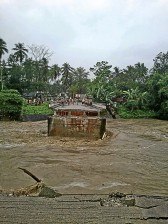Baganga farmers ask to be allowed to sell fallen coco trees for lumber

Rampaging floodwater with logs and uprooted trees destroyed the Caraga Bridge in Caraga town, Davao Oriental province last December. FILE PHOTO
DAVAO CITY, Philippines—Coconut farmers in the town of Baganga in Davao Oriental are asking the Philippine Coconut Authority to help them recover from the devastation left by Typhoon Pablo last December by allowing them to sell fallen coconut trees outside the province without having to pay any fees.
Jose Tinio, whose 10-hectare coconut farm was among those severely damaged by the typhoon, said the sale of the fallen logs in the form of coco-lumber would help alleviate the suffering of people in Baganga by giving them a chance to earn some cash.
Another landowner, lawyer Leo Caubang of the Caubang Law Office in Davao City, wrote a letter to the PCA administrator, asking if coconut farmers devastated by the typhoon could be allowed to sell their fallen coconut trees to buy food and medicine for their families.
“Several farmers wanted to sell their coco lumber but they were admonished by PCA provincial officials in Davao Oriental that they should secure a permit or else they will be apprehended,” Caubang wrote in a January 13 letter to PCA administrator Euclides Forbes. “Farm owners wanted to turn the uprooted coconut trees into coco lumber to buy food and medicine for our people,” he said.
Forbes had earlier issued a memorandum exempting people in typhoon-ravaged areas of Compostela Valley, Davao Oriental, Agusan del Sur and six other provinces from the payment of fees for cutting down coconut trees so they could use fallen coconut trees to rebuild their houses. But the exemption covered only trees that the farmers were going to use to rebuild their houses and not for trees that were to be taken out of the province or sold to lumberyards.
“We appeal to our PCA officials to understand the plight of coconut farmers badly devastated by the typhoon,” said Tinio. “Other countries have the heart to help Baganga, why is it that the PCA is making it hard for the coco farmers to sell?”
He said that without the PCA exemption, he has to pay a fee of P75 per tree, which is quite high for most people whose livelihoods were wiped out by the typhoon.
“We want to sell our coco lumber even in areas outside Baganga where there are buyers,” Tinio said, adding that the number of trees uprooted by the typhoon were more than enough to rebuild all the houses destroyed by the typhoon in Cateel and Baganga.
“Even the governor knew that the fallen trees are more than enough to rebuild all houses. A large number of those fallen trees will only rot if they’re not put to use,” he said, referring to Davao Oriental Gov. Cora Malanyaon, who had earlier lifted the ban on the transport of coco lumber out of the province. “That’s why we want to sell them before they go to waste.”